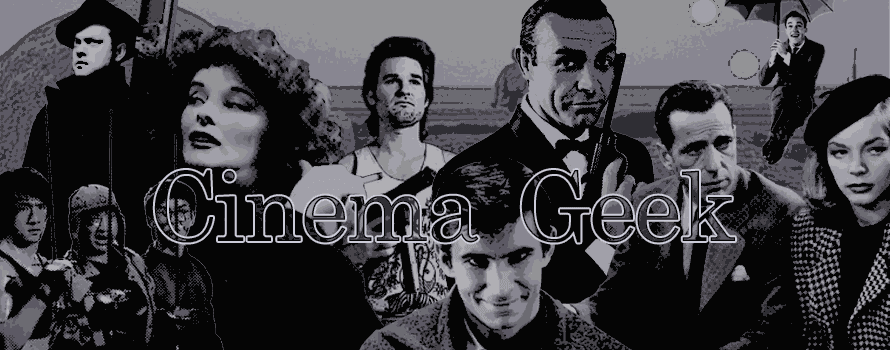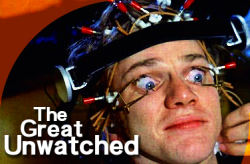"In the past, I have given you many kinds of suspense pictures. But this time, I would like you to see a different one."
Alfred Hitchcock is known primarily for his thrillers and suspense films, but this is a very different kind of Hitchcock film--which stands out as one of his very best, both for its distinction from much of the rest of the director's body of work, and also by virtue of being a damn fine motion picture.
Sure, The Wrong Man builds an almost unbearable amount of suspense, but in a very different way from many of Hitchcock's other works. This time around, the director tells the real-life story of Manny Ballestrero, a Stork Club musician and mild-mannered family man mistakenly sent to prison for a crime he didn't commit. The majority of the powerful tension created here derives from the fact that we know Ballestrero is innocent, and are powerless to do anything but watch as he gets trapped tighter and tighter in a net of bad luck and circumstantial evidence.

But it's because of the magnificent performance of Henry Fonda that this whole ploy on Hitchcock's part works. The movie's ultimate good guy (well, until Once Upon a Time in the West), Fonda has boatloads of pathos in the role of the put-upon and unflappably virtuous Ballestrero, and we can't help but feel for the guy as things go from bad, to worse, to far, far worse. It's also a credit to both Hitchcock's direction, and the screenplay by Maxwell Anderson & Angus MacPhail, that somehow Ballestrero continues to act inadvertently as if he were guilty, even though he is not.

This character nuance rings true, and lends an air of realism to the proceedings. It also generates tremendous frustration, as the viewer takes in the worsening plight of the protagonist, mistaken for a stick-up man from a prior bank robbery, all the while agonizingly hoping someone will give him a break. Anderson, writer of such classic films as All Quiet on the Western Front, Death Takes a Holiday and The Lives of a Bengal Lancer, as well as the original stage play of The Bad Seed, adapted the story from true events, and teamed with MacPhail--who had worked with Hitch a decade earlier on Spellbound--to create a maddeningly tense script worthy of the master of the nail-biters.

Joining Fonda is Vera Miles in the role of Manny's wife Rose. Also known to Hitchcock fans for playing sister to Janet Leigh in Psycho, Miles is utterly gripping in the role of a very flawed woman. Rather than play it all Hollywood, the film shows the true-life fallout of Ballestrero's plight and the effect it has on his spouse. Rose is a damaged character, and her arc, as brilliantly dramatized by Miles, is another testament to the unblinking realism of the picture. No easy way out here.
What I also enjoy about the film is its portrayal of ethnic Americans in a completely non-stereotypical fashion. Manny and Rose are Italian-Americans, and yet this is subtly downplayed throughout the picture, rather than played as some kind of broad character trait, whether for negative or positive effect. It's simply part of who they are, and only plays minimally into the story. When it does pop up, as with so much in the film, it rings completely true.

The movie is crisply shot by Robert Burks, Hitchcock's go-to man for much of the 1950s and '60s. Burks had shot Strangers on a Train, Dial M for Murder, Rear Window, To Catch a Thief and The Man Who Knew Too Much prior to this, so he clearly had no trouble interpreting what his director wanted. And clearly his director was pleased, as he would go on to use him for Vertigo, North by Northwest, The Birds and Marnie.
Bernard Herrmann, another Hitchcock stalwart, turns in a stellar score, less string-heavy and more jazzy to reflect Ballestrero's profession. It's a blaring, jarring, yet also beautiful piece of music, perfectly accompanying Manny's trials and tribulations, and even foreshadowing what Herrmann would bring to the table 20 years later for his final film, Martin Scorsese's Taxi Driver.
Take Henry Fonda, one of the most beloved and well-liked actors of all time, team him with the man many consider the finest director of all time, and what you get is a film that is both touching and raw, suspenseful without being sensational. It deals with decent, everyday people, in very trying situations, all the more powerful because it really happened.
The Wrong Man is a film that is often overshadowed by Hitchcock's more sweeping, larger than life movies, or his more stylish, lurid and sexy potboilers. But it's one that should be sought out by film lovers, especially lovers of crime drama and post-World War II era cinema in general. And certainly by fans of Alfred Hitchcock, who thought enough of the picture to open it with a personal introduction.
NEXT UP: 12 Angry Men (1957)













